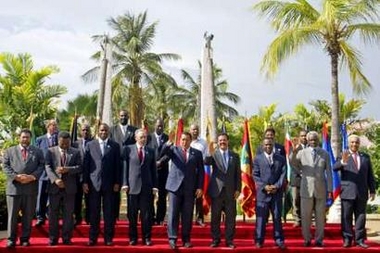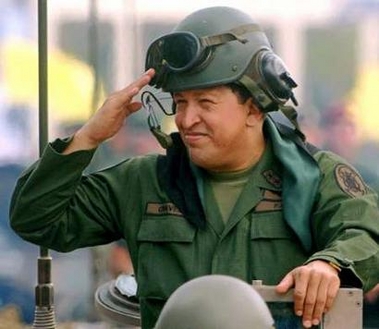Untitled Document

Chávez Poses With Leaders from Latin American and Caribbean Nations at an 'Oil Summit'
Caracas: At the first Caribbean Energy Summit, which brought together heads of
state from around the Caribbean region, President Hugo Chávez told his
guests that Venezuela is a global epicenter of petroleum, and that supplying it
has become an, "unsettling burden, because of the ambition and voraciousness
of developed countries in the north, first and foremost the United States."
"And now there is more reason to say this, because of the crisis that
has appeared on the global horizon. We don't want to be alarmist, but the problem
is coming nearer, and failing to address it would be irresponsible," he
said, speaking at the Maremares Hotel in Puerto La Cruz, in Anzoátegui
State.

Chávez Reviews the Troops
Chavez then recalled reading in the newspaper that he sends 1.5 million barrels
of oil per day to the United States. "I don’t know what they would
do without these 1.5 million barrels of petroleum. It would shut off -- I don’t
know how many cities and factories."
In addition, he said that "the government of Mister (George W.) Bush,
although it attacks us, is subsidized by Venezuela because of imperialistic
agreements - or rather colonialist - that were signed in the past, so Venezuela
sells [oil] to him at a $2 to $3 discount."
Chávez described this U.S. discount as "violating the national
interest," while considering the difficulties of the countries participating
at the summit meeting.
The Chief of State affirmed that all of the previous Venezuelan governments
that have tried to use the nation's petroleum to serve the country's sovereign
interests had been overthrown, which is why he considers that petroleum has
been the primary cause of the conflicts that Venezuela has faced for the last
100 years. He then recalled his "brief" overthrow of less than 48
hours in April of 2002.
CARRIBBEAN AND SOUTH AMERICAN ‘ARC OF ENERGY’
President Chávez proposed the creation of an "arc of energy cooperation"
in the Caribbean and South America. He said that in addition to Mercosur, where
the countries of South America are integrated commercially, the Caribbean nations
must be united around this "arc of energy" by using Venezuela as a
bridge.
"For centuries, Venezuela has been and continues to be a being, but the
traditional code of the geopolitics in our country and this territory …
is that Venezuela is a bridge between the north and south, the Caribbean, the
Atlantic, and the Pacific," he explained.
Due to the increased worldwide demand for crude, President Chávez dismissed
the possibility that the price of petroleum would ever again drop near the $20
dollar level.
"If anyone thinks that the price of a barrel of petroleum is going to
return to $20, they are mistaken. With this picture of increasing demand, it
is impossible," Chávez said.
He reiterated that Venezuela has "never" sought high prices for petroleum,
recalling that was his government that proposed price limits to the Organization
of Petroleum Exporting Countries (OPEC).
He said that things have been made difficult by the situation in Iraq, and
that even though Iraq now produces 500 million barrels a day, the election of
extreme conservative Mahmoud Ahmadinejad as president of Iran, the pressures
coming from the United States, "greatly complicates the panorama.”
"In Iran, he the mayor of Tehran, a man of 49-years, has won a clear and
convincing victory. This is likely to complicate the global oil panorama for
some time to come, especially because of the United States.”.
Chávez said that Ahmadinejad’s election and President Bush’s
recent speech on the invasion to of Iraq, are "factors" that "influence"
the high price of crude oil, AFP reported Chavez as saying.
"The reason we heard the president of the United States last night say
in a speech that, among other things, ‘We still have much to do in Iraq'
... is that they themselves know there is no short-term solution," emphasized
Chávez.
Ultraconservative Mahmoud Ahmadinejad won the Iranian Presidential election
over the more moderate Akbar Hashemi Rafsanjani last Friday.

